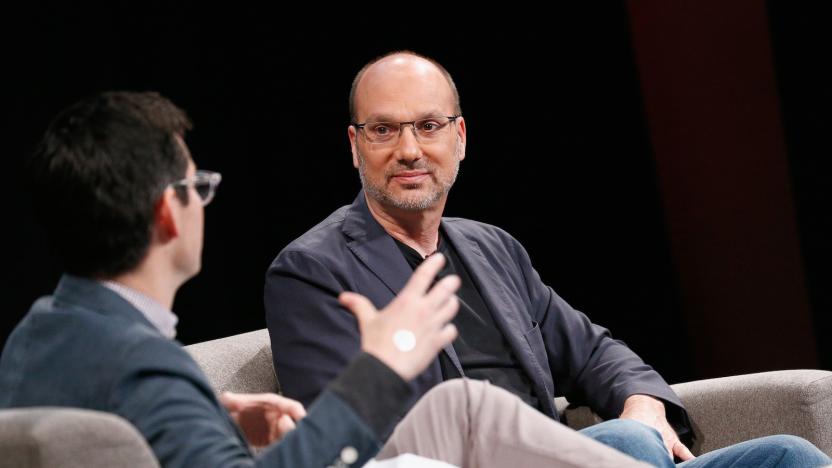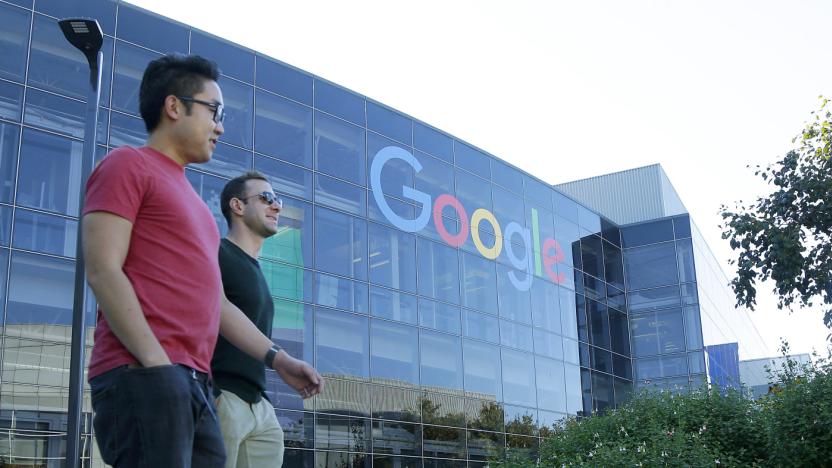amitsinghal
Latest

Lawsuit accuses Google of hefty payouts to execs accused of misconduct
Google's handling of sexual misconduct by executives is coming under more scrutiny thanks to new details emerging from a shareholder lawsuit. Investors have claimed Google chief Larry Page granted Android creator Andy Rubin a $150 million stock grant without seeking approval of the board first, even though Rubin was under an investigation at the time. Page instead got "rubber stamp" approval eight days after the fact, according to the suit. It's not certain if he was aware of the investigation.

Google reportedly paid Andy Rubin $90 million after misconduct probe
Android co-founder Andy Rubin left Google in 2014 and while it seemed at the time that he left on his own accord and that the split was amicable, reports surfaced last year that depicted a different situation. The Information, citing multiple sources, said that Rubin's departure was due to an investigation into an inappropriate relationship he had with a subordinate, a woman who later filed a complaint against Rubin with Google's HR department. While details of those claims and Rubin's exit were sparse, the New York Times now reports that Rubin was paid $90 million on his way out, despite the company finding the woman's claims credible.

Uber's SVP of engineering resigns amid allegations of sexual harassment
Uber's highly regarded SVP of engineering Amit Singhal has been asked to leave the company after reports emerged that he was involved in a sexual harassment case while he was still employed at Google. According to Recode, Singhal was with Uber for about a year before the site informed Uber of the allegations against him this week. Singhal, who was regarded as a powerful figure within the search giant, failed to disclose the reasons for his departure to his new employer and Uber claims their own background checks didn't catch the accusations against him.

Google's new head of search is an AI research leader
There's a changing of the guard underway at Google... and it could have big ramifications for how the company tackles its main business. Senior VP of search (and early employee) Amit Singhal is retiring on February 26th, and he's being replaced by John Giannandrea, the VP who leads the company's artificial intelligence and research work. In the process, Google is folding its research division into search -- it's now an integral part of how Google operates.

Behind the scenes video reveals Google's attention to search detail (video)
If you're interested in how much detail the engineers at Mountain View pay to every element of Google's search business, check this out. This is footage of the Quality Launch Review, a meeting that takes place every week on Thursdays. Amit Singhal assembles a room full of engineers to delve into "losses," the company term for when a search query goes awry, and turn them into "wins." This week, the team examined error-correction in searches that are over ten words long, and how best to resolve it. It may not be the most exciting thing you'll ever see, but it's a fascinating insight into the effort that begins every time you don't find what you're looking for.

Google offers its own brief history of search (video)
Wondering how we got from there to here? It's not the most exhaustive or objective history, but Google has released a new video today that it describes as the "evolution of search in six minutes." It includes contributions from the likes of Google's Ben Gomes, Amit Singhal and Marissa Mayer, and it traces the company's search history from its beginnings as a research project in 1996 to its current technologies like instant results and search by image or voice. While specifics are expectedly light, it does also offer a few hints of what Google sees as the future of search, including Amit Singhal's dream to build a "Star Trek computer." See the whole thing for yourself after the break.

Google responds: Bing recycles search results, and we'd like it to stop
Google accused Microsoft of copying search results this morning, and the company's sticking to its guns: in response to Microsoft's firm denial -- "We do not copy Google's results" -- it's released another tiny batch of evidence to the contrary and a call for Microsoft to discontinue the practice for good. Mind you, Google search engineer Amit Singhal doesn't explicitly call out its competitor for "copying" results -- rather, "recycling" them through a clever combination of Microsoft Internet Explorer and the Bing Toolbar -- but the message is clear. Google wants you to view its search results as the originals, and doesn't really care how sincere Microsoft's flattery might be.

Google accuses Bing of 'cheating,' piggybacking off its search results (updated)
You could say Bing is taking a cue from its competition, but it seems to be more literally taking search results as well. Google Fellow Amit Singhal is claiming so much and has provided some amusing (if not totally clever) results from its "Bing Sting." Here's how it works: find a search term that returns no matches for either site, make a "honeypot" page manually appear for the term, then have about 20 Google employees make the search (and click the top link) using Internet Explorer with both Suggested Sites and the Bing Toolbar on. Within two weeks, Singhal claims, a handful (about 7 to 9) of the 100 or so "honeypot" results were popping up in Bing. Bizarre choices, too, like mbrzxpgjys, hiybbprqag, and indoswiftjobinproduction. So, is this "cheating," as Singhal specifically alleges? The experiment had to be run with Bing's toolbar and / or Suggested Search feature activated, which it explicitly says are used to collect data and improve services. And more popular search terms do return different results, It's not as if Microsoft is using non-public information, but is this an example of taking an unfair shortcut? That's a debate we imagine with rage for quite some time. Update: Microsoft's been sending out the following statement from Stefan Weitz, director of Bing: We use multiple signals and approaches in ranking search results. The overarching goal is to do a better job determining the intent of the search so we can provide the most relevant answer to a given query. Opt-in programs like the toolbar help us with clickstream data, one of many input signals we and other search engines use to help rank sites. That's pretty ambiguous, so ZDNet's Mary Jo Foley pressed for a followup and was flatly told "We do not copy Google's results." We're sure there's going to be a lot more analysis and discussion to come -- this ought to be fun.

Google refocuses under Larry Page; Eric Schmidt says Microsoft is bigger competition than Facebook
Now that the dust has settled from the Google CEO shuffle that will see Larry Page take the top spot from Eric Schmidt in April, it's time for the profiles of the company to hit -- and Bloomberg BusinessWeek is up first with a piece that examines the company's past and future challenges, as well the key leaders of what it calls "Google 3.0": Vic Gundotra, who's heading up a now-not-so-secret social networking initiative called Google +1, Android chief Andy Rubin, YouTube head Salar Kamangar, advertising lead Susan Wojcicki, Chrome head Sundar Pichai, and search leads Udi Manber and Amit Singhal. It's all very fascinating, and it includes some great anecdotes, like Vic Gundotra and Phil Schiller getting into an argument about user location-tracking so heated that Eric Schmidt and Steve Jobs had to intervene. Yeah, it's like that. Speaking of Eric Schmidt, he was in Davos this week, and he had some choice words for reporters on Google's competition -- and it's not Facebook. "Microsoft has more cash, more engineers, more global reach. We see competition from Microsoft every day," says Eric, while Facebook "has clearly stated they don't want to get into the search business. Facebook users tend to use Google search." As for Apple, he gave the usual line about both partnering with and competing with Cupertino, while taking a moment to laud Steve Jobs as "the most successful CEO in the world anywhere," who's built an "elegant, scalable, closed system" while "Google is attempting to do something with a completely different approach." Spoken like a true frenemy, we suppose. Check out the source links to read both pieces.

Google under fire for promoting own content ahead of competing websites
This isn't exactly a new allegation, but the idea's spreading fast: Google is tuning search results to favor itself, and perhaps that's not entirely fair. Though the European Union is already investigating Google for potential antitrust violations, a recent article in the Wall Street Journal cites several US businesses that aren't too happy themselves, claiming that Google Places, Product Search and the like took a big chomp out of their traffic. Google's defense, as usual, rests on its secret algorithms, which it claims aren't rigged in any way, adding that the prominent placement of location- and product-based search results are just a way to get users quicker answers to their queries. If you type in "day spa nyc," you're looking for some catered suggestions, right? And what of those who argue differently? Well, obviously they're in league with Microsoft.

Google's Amit Singhal tells us about the dreams search engines are made of
Do Googlers dream of electric algorithms? For a little insight into what makes the search engine that became a verb tick, we recently attended a talk by Amit Singhal, one of its chief engineers. Amit is part of the team in charge of tweaking and improving Google's ranking algorithms and has 20 years of experience when it comes to sorting through data, with that time split into even decades spent within the academic sphere and over in Mountain View. What he had to tell us mostly revolved around his aspirations from when he started out back in 1990, but it's the way that Google has acted to meet each of those goals that's the fun and interesting stuff (or as we like to call it around here, the meat). So do put on your reading monocle and join us past the break.%Gallery-97608%



